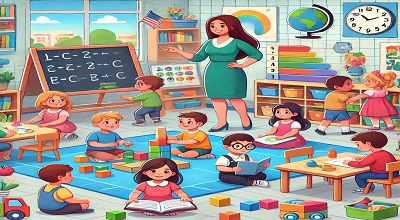Developmentally Appropriate Practice
Developmentally Appropriate Practice (DAP) is an educational framework and approach that is grounded in research and theory about child development and learning. It is used to guide educators, caregivers, and parents in providing age-appropriate and culturally sensitive learning experiences for young children, typically from birth to age eight. DAP takes into account the individual needs, abilities, and interests of children, recognizing that each child is unique and develops at their own pace.
Key principles and components of developmentally appropriate practice include:
- Age Appropriateness: DAP emphasizes the importance of tailoring educational activities and materials to a child’s chronological age, recognizing that children go through different stages of development as they grow.
- Individualization: DAP recognizes that children have diverse backgrounds, abilities, and learning styles. It encourages educators to adapt their teaching strategies to meet the individual needs of each child.
- Active Learning: Children learn best through hands-on experiences and active engagement. DAP promotes activities that allow children to explore, experiment, and interact with their environment.
- Play-Based Learning: Play is seen as a crucial vehicle for learning in early childhood. DAP encourages the use of play-based activities to foster social, emotional, cognitive, and physical development.
- Responsive Teaching: Educators should be attuned to children’s cues and interests and be responsive to their questions and ideas. This helps create a supportive and nurturing learning environment.
More Read…
- Holistic Development: DAP recognizes that children’s development is multifaceted, including cognitive, social, emotional, and physical domains. Educational activities should address all aspects of a child’s development.
- Cultural Sensitivity: It’s essential to consider the cultural backgrounds and experiences of children and their families when planning and implementing educational activities. DAP promotes inclusive and culturally relevant practices.
- Assessment: Assessment in DAP is focused on observing and documenting children’s progress and understanding. It should be ongoing and used to inform instruction, rather than being solely based on standardized tests.
- Collaboration: DAP encourages collaboration between educators, parents, and caregivers to support children’s development. Open communication and sharing of information are essential.
- Reflection and Professional Development: Educators should continuously reflect on their practices and seek opportunities for professional development to stay current with research and best practices in early childhood education.
DAP is widely used in early childhood education settings, such as preschools, daycare centers, and kindergarten classrooms, to create developmentally appropriate curricula and teaching methods that promote positive outcomes for young children. It helps ensure that children have a solid foundation for future learning and development.
Some Examples of Developmentally Appropriate Practice
Developmentally Appropriate Practice (DAP) encompasses a wide range of strategies and activities tailored to the specific age, needs, and abilities of children. Here are some examples of DAP in various areas of early childhood education:
Literacy and Language Development:
- Reading age-appropriate books and stories aloud promotes early literacy skills.
- Encouraging storytelling and discussions to develop language and communication skills.
- Providing a print-rich environment with labeled items to promote early reading and writing.
Mathematics:
Using manipulatives like blocks or counting beads to teach basic math concepts such as counting, addition, and subtraction.
- Incorporating math concepts into everyday activities, like measuring ingredients during cooking or sorting objects by size and shape.
Science:
- Conducting simple experiments and hands-on activities to explore concepts like cause and effect, gravity, or the properties of water.
- Encouraging observation and curiosity by exploring the natural world, such as observing insects or plants in a garden.
Social and Emotional Development:
- Promoting social skills through activities like group games, cooperative play, and role-playing.
- Teaching emotional regulation and empathy through discussions and stories about feelings and relationships.
- Physical Development:
- Providing opportunities for gross motor skills development through activities like running, jumping, and climbing.
- Offering fine motor skill activities such as drawing, cutting with scissors, or manipulating small objects.
Art and Creativity:
- Allowing children to explore various art materials, such as paints, clay, and collage materials, to express themselves creatively.
- Fostering open-ended art projects where children can make choices and use their imaginations.
Dramatic Play:
- Setting up dramatic play areas with props and costumes, encouraging imaginative play and role-playing.
- Allowing children to take on various roles, like pretending to be a doctor, chef, or firefighter.
Outdoor Play:
- Providing outdoor play spaces with opportunities for exploration, physical activity, and interaction with nature.
- Promoting gross motor skills, sensory experiences, and an understanding of the natural world.
Assessment and Documentation:
- Observing and documenting children’s interests, strengths, and areas for growth to inform curriculum planning.
- Using developmental checklists and portfolios to track children’s progress and share insights with parents.
Cultural Sensitivity:
- Celebrating cultural diversity through activities, books, and materials that reflect the backgrounds of the children in the classroom.
- Incorporating culturally relevant stories, music, and traditions into the curriculum.
These examples illustrate how DAP involves tailoring educational experiences to meet the unique needs and developmental stages of young children, fostering a rich and engaging learning environment that supports their growth and learning.
